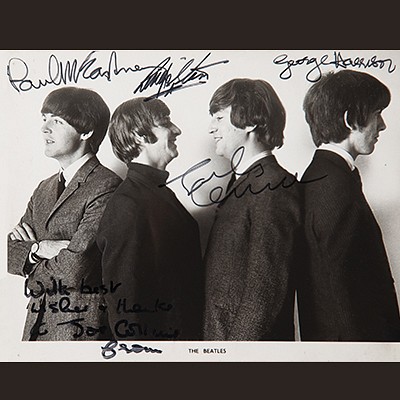Bob Marley Twice-Signed Music Contract, with Rare "Robert Marley" Signature
Two ways to bid:
- Leave a max absentee bid and the platform will bid on your behalf up to your maximum bid during the live auction.
- Bid live during the auction and your bids will be submitted real-time to the auctioneer.
Bid Increments
| Price | Bid Increment |
|---|---|
| $0 | $5 |
| $50 | $10 |
| $200 | $25 |
| $500 | $50 |
About Auction
Dec 14, 2023
RR's semi-annual Marvels of Modern Music auction features over 250 chart-topping items from renowned rock and rollers, punk pioneers, classic crooners, and great guitarists. RR Auction support@rrauction.com
- Lot Description
Important DS, signed twice as “Robert Marley" and "Bob Marley,” one page, 7.25 x 13, [1976]. The concluding page of a contract with music publisher Almo Music, featuring a “Prior Agreement” passage that concerns Marley’s previous contract with Cayman Music. In part: “Publisher acknowledges...that there is presently in effect an agreement between Writer and Cayman Music Ltd. ("Cayman"), which agreement shall expire by its terms at the close of business on October 10, 1976. It is the intention of the parties hereto that the term of this agreement shall commence immediately upon the expiration or valid termination of said agreement with Cayman...Accordingly, no musical composition the ownership or control of which shall be validly retained by Cayman under the terms of said agreement shall be covered hereunder.” Signed twice at the conclusion in black ballpoint, once as “Robert Marley,” president of Bob Marley Music Ltd., and once as “Bob Marley,” the songwriter. Matted and framed to an overall size of 14.5 x 21. In fine condition. Accompanied by a letter of authenticity from Recordmecca's Jeff Gold, who states that the document originates “from the collection of a former Almo Music executive.”
This offered 1976 contract was of great importance to Bob Marley, whose latest album, Rastaman Vibration, became his first to reach the Top 10 in the Billboard 200 chart, a feat aided by his most popular U.S. single ever, ‘Roots, Rock, Reggae.’ Marley’s displeasure with his deal with Cayman Music, which was owned by his former manager Danny Sims and singer Johnny Nash, was reflected in the liner notes of Rastaman Vibration. ‘[Rastaman Vibration's] liner notes list multiple songwriters, including family friends and band members, all songs were written by Marley. Marley was involved in a contractual dispute at the time with his former publishing company, Cayman Music. Marley had not wanted his new songs to be associated with Cayman and it was speculated...that he had put them in the names of his friends and family members as a means of avoiding the contractual restrictions and to provide lasting help to family and close friends.’ This contract with Almo Music offered Marley an exit. When Marley's next album, Exodus, was released in June 1977, the songs were again credited to Marley and published by Bob Marley Music/Almo Music Corp. A unique twice-signed Bob Marley collectible that boasts his exceedingly rare “Robert Marley” signature. - Shipping Info
-
Bidder is liable for shipping and handling and providing accurate information as to shipping or delivery locations and arranging for such. RR Auction is unable to combine purchases from other auctions or affiliates into one package for shipping purposes. Lots won will be shipped in a commercially reasonable time after payment in good funds for the merchandise and the shipping fees are received or credit extended, except when third-party shipment occurs. Bidder agrees that service and handling charges related to shipping items which are not pre-paid may be charged to a credit card on file with RR Auction. Successful international Bidders shall provide written shipping instructions, including specified Customs declarations, to RR Auction for any lots to be delivered outside of the United States. NOTE: Declaration value shall be the item’(s) hammer price and RR Auction shall use the correct harmonized code for the lot. Domestic Bidders on lots designated for third-party shipment must designate the common carrier, accept risk of loss, and prepay shipping costs.
-
- Buyer's Premium



 EUR
EUR CAD
CAD AUD
AUD GBP
GBP MXN
MXN HKD
HKD CNY
CNY MYR
MYR SEK
SEK SGD
SGD CHF
CHF THB
THB












